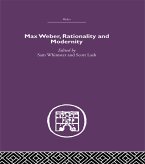Andreski places Weber in his social and cultural context of the intellectual preeminence of German culture in the second half of the nineteenth century. He examines Weber's most famous theses on objectivity, methodological individualism, ethical neutrality; explanation versus understanding; ideal types; rationalisation; bureaucracy, charisma, power, law and religion; as well as the explanation of the rise of capitalism and uniqueness of Western civilization.
Andreski concludes by considering what contemporary scholars should learn from Weber if they want to advance further. He argues that the most important lesson is that comparative study of history (including recent history) is the only method of giving empirical support to an examination of large-scale social processes or a general proposition about them.
This book was first published in 1984.
Dieser Download kann aus rechtlichen Gründen nur mit Rechnungsadresse in A, B, BG, CY, CZ, D, DK, EW, E, FIN, F, GR, HR, H, IRL, I, LT, L, LR, M, NL, PL, P, R, S, SLO, SK ausgeliefert werden.









